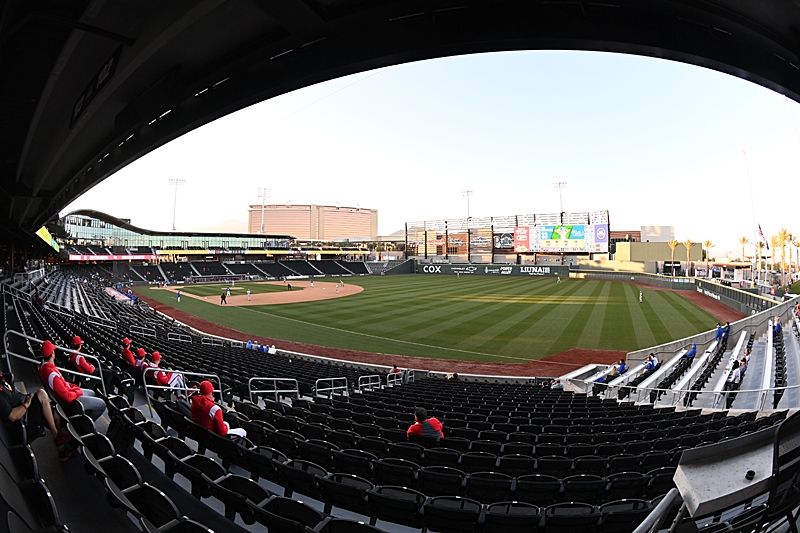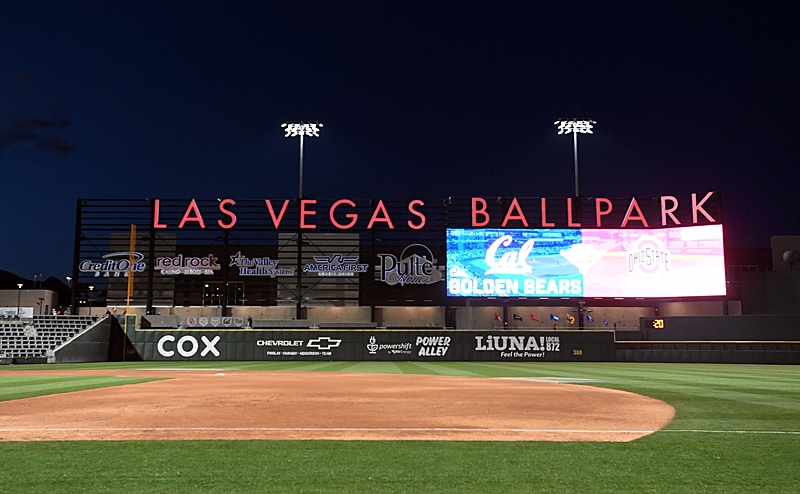
There was no second game of the weekend three-game series because, surprise, in the middle of winter even the desert Southwest was too cold, too wet, and too windy.
 Las Vegas, NV – Imagine playing baseball in 70 mile per hour winds.
Las Vegas, NV – Imagine playing baseball in 70 mile per hour winds.
Well, as it turned it out it was unimaginable in Las Vegas, Nevada on Saturday as Ohio State’s game with Pittsburgh was cancelled after a four-hour wait at the ballpark, because even when you hope for the best March weather imaginable, reality reminds that it’s still winter for another eighteen days. And the best-hoped-for-scenario went for naught this weekend.
Financially, Ohio State, the University of California, Oklahoma and Pittsburgh have spent a quarter million dollars in air travel, hotels, and meals because college baseball just has to be played within the framework of a nine month calendar. 56 regular season games have to be played between the middle of February and the middle of May.
To do it schools spend millions on shipping their athletes to warmer climes for the sake of baseball while knowing…yes, it’s still winter. When you try to cheat Mother Nature, invariably what has happened in Las Vegas this weekend is sometimes what you get.
Then you get athletic administration who complains about the cost of baseball, compared to the lack of revenue that baseball generates.
Even in Las Vegas, what are the odds of someone sitting outside in 70 mile per hour wind to watch baseball in March? In May, the odds are in your favor.
You say, “Well, this is clearly abnormal.” And you would be right. The average March daytime temperature in Las Vegas is 74 degrees. Only, it’s not average THIS weekend.
So you sit here with $14,000 invested in air travel, $6,000 invested in hotels, another $6,000 invested in food, and whatever charter buses cost – let’s call it $30,000 – for a wild goose chase.
Yes, the suits maintain, the best laid plans, you know……and besides, we’ve always done it this way.
But, consider a new norm by starting the college baseball season in April, not February, and consider how the percentages for cost savings, efficiency, and predictability go up significantly.
On top of that, consider the possibilities of marketing college baseball in warm, predictable weather, and selling enough tickets to actually help offset the costs.
You’d have to win, yes. People want to pay to see success. But you have to win in football and basketball, as well. Because if you don’t win in those sports, they move mountains and heads roll. Universities rely on football and basketball to pay the freight for every other college sport, even women’s sports.
And yes, it’s true that some women’s basketball programs have come a long way in this respect, but the majority haven’t and still rely on football to pay the way.
But while almost every high school and college administrator points to the empty costs of maintaining a baseball program, we literally do nothing, calendar-wise, to address the problem. And while we do nothing, we continue to maintain that the dreams of those who play baseball and softball in the spring are just as relevant, and important, as those who play football and basketball in more predictable conditions.
I don’t have a solution that would find universal acceptance, but I know that at this point it’s not a priority.
And I also know that when that rare athlete who becomes a professional comes back to alma mater and writes a fat check to support the status quo, no one ever turns it away. It…gets…cashed.

Publisher/Editor Sonny Fulks writes OHSAA and Buckeye baseball for Press Pros Magazine.
So we’re sitting here in Las Vegas, looking out windows at palm trees whose tops are bent over nearly double, and consider the lost opportunity and expense for trying to do too much, too soon.
“It’s a shame,” said Ohio State’s Bill Mosiello Saturday. “College baseball is built around three-game series. You want to play because you want to see what you’re made of. Yeah, we’ll probably play tomorrow, but you want to play that extra game because it’s a greater test.”
In the meantime, we take credit for making the bests of a bad situation and doing what’s best for kids, which is laughable, given the record of the NCAA.
And, we’ll keep spending millions more than necessary because we play against Mother Nature, instead of with her.
And justify it by saying…this is how we’ve always done it.




